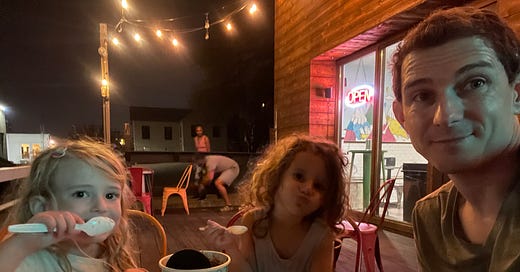my story 🚀
i’ve been thinking 💭
About a week ago our daughter confidently declared that people named Ian always copy—that’s just what they do! We’ve been reading the children’s book Olivia to her for years. Early in the book, we’re introduced to Olivia’s family. “Olivia has a little brother named Ian. He's always copying.” Our daughter didn’t know any other people named Ian until this school year started. There’s a boy named Ian in her class, who, like all 5-year-olds, engages in some copying. She drew the connection. Can we blame her for discerning a general name-behavior association?
This is what humans do, after all. We’re generalizing machines, and that helps us make sense of our complex world. But it does come at the cost of often misunderstanding the world. Our younger daughter currently refers to all flying insects as bees. With enough experience, we learn where our generalized ideas don’t fully apply, or may even be flat our wrong (case in point: Ians are not all copycats).
The latest cohort of AI models (chatGPT, Bard, etc.) behave similarly. They absorb information and draw conclusions from associations. When we read examples of AI bias, we can think of them as flawed generalizations. After all, their output is a function of their training data. Much like humans, as the models gain exposure to more detailed data (“fine-tuning”), they get better at picking apart the nuances. We might keep in mind that these models are still in their infancy, and with more “experience” they’ll also “learn” where those generalizations fall short.
fun facts 🙌
Big houses were full of guests. “In a modern context, big houses rarely serve any narrative purpose beyond jokes about rooms nobody has ever been in, but historically, all that extra space had an important function.” ~ learn more
Gynadromorphism. Any time someone chooses to take really simplistic view of nature, this sort of thing should help snap them out of it. ~ learn more
Woodstock ‘99 sounds awful. “With a combination of price gouging, an awful venue, heat, and an overall horrible vibe, Woodstock ’99 has gone down as one of the most chaotic music festivals in history. We've rounded up some shocking firsthand accounts from people who actually attended the festival.” ~ learn more
oh, chicago 🏆
The puffy coat bandits. “They’re smooth, swift and unforgettable in their puffy coats. A three-man crew of pickpockets and purse-snatchers has worked their way through the Near North Side bar and restaurant scene for months, stealing from unsuspecting patrons. Restaurant owners said they’re amazed the crew hasn’t been caught.” ~ learn more
tech, startups, internet ⚡
Emergent abilities of large language models. The concept of emergence is a few decades old at least. It’s fascinating. From an article I shared last year: “When electrons or atoms or individuals or societies interact with one another or their environment, the collective behavior of the whole is different from that of its parts.” This paper discusses that same phenomenon which is now visible in language models of sufficient scale. ~ learn more
The trouble with Bing’s AI chatbot. “This week, people have started gaining access to it via the waiting list. It’s increasingly looking like this may be one of the most hilariously inappropriate applications of AI that we’ve seen yet.” ~ learn more
better doing 🎯
Why you should stop caring what other people think. An old post on Tim Urban’s Wait But Why. “Because of this, humans evolved an over-the-top obsession with what others thought of them—a craving for social approval and admiration, and a paralyzing fear of being disliked. Let’s call that obsession a human’s Social Survival Mammoth.” ~ learn more
under the microscope 🔬
Weeklong improved color contrasts sensitivity after single 670 nm exposures. “Time of exposure is critical, as 670 nm light is only effective in the morning. This time dependent effect is likely due to the demonstrated shift in mitochondrial function across the day, and light exposure is likely only effective when synchronised to an aspect of this process.” ~ learn more
The genome editing revolution. “Fundamental insights into microbial host-virus interactions led to the development of tools for genome editing using restriction enzymes or the revolutionary CRISPR-Cas technology. In this review, we provide a historical overview of milestones that led to the genome editing revolution and speculate about future trends in biotechnology.” ~ learn more
CRISPR study questions everything we know about "love hormone" oxytocin. “A new study unexpectedly found prairie voles genetically modified to carry no oxytocin receptors still formed strong social bonds and retained the ability to nurse offspring” ~ learn more





So fascinating reading all of the Bing ChatGPT prompts to get it to where it is. So crazy too that one of an engineers jobs in this scenario is all about prompt writing. What an interesting and important need for this skillet 🤯